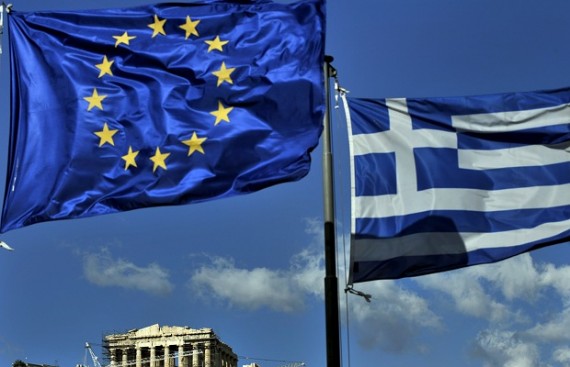Why Does Europe Want To Keep Greece?
It's easy to see what Greece thinks it still needs Europe, it's more of puzzle why Europe thinks it needs to hang on to Greece.
Megan McArdle wonders why the Europeans are seemingly so concerned about the future of Greece:
To answer the question about why the euro zone would want to hold onto Greece, I think you have to get into the same kind of emotional and historical attachments that Britain has to Northern Ireland, except of course that it’s the euro that Europeans are attached to, not the remnants of a fading empire. And I think that this weekend we started to see the limits of those sorts of attachments. A lot of smaller countries are getting to the “I have had enough” point. Germany seems as if it might be ready to join them. It looks as if the coalition of the unwilling came pretty close to carrying the day during this weekend’s marathon talks; the only thing that saved them was heroic efforts by the shrinking core that was absolutely determined to make a deal.
That suggests to me that we are now at the make-or-break moment for the Greek-Euro relationship. Either Greece will succeed with a fairly brutal austerity plan to the satisfaction of its euro-zone partners, or the next time they come to the table, the Greeks will be signing divorce papers. Because once you start asking yourself why you want to be in such a costly relationship, you’ve already got one foot out the door.
It’s an interesting question, actually, because as I’ve noted before in the long run Greece needs Europe a heck of a lot more than Europe needs Greece. If it does turn out that this latest deal doesn’t solve anything, which is certainly entirely possible, and Greece and Europe’s bankers find themselves looking across a table at each other again, the prospect of Greece leaving the Euro is obviously something that should scare Greece a lot more than it should scare the Europeans. With Europe, Greece would largely be on its own, would still have to worry about the debts that it owes to European banks and the International Monetary Fund, would no longer be able to benefit from the reduced transaction costs of a common currency, and potentially would no longer be able to benefit from open trade and travel rules that come with a united Europe. Europe, on the other hand, would likely be only slightly impacted by a Grexit. Indeed, the economic impact of such an exit would likely be minimal in the long term, although it’s probable that we’d see some negative impacts in financial markets in the short term. If there is a risk to Europe from such an event, it’s a political one in that a Greek exit from the Euro could be the first in a series of dominoes that lead to a dismantling of the European Union itself, but to be honest those issues are going to exist regardless of what happens to Greece.
Given that, what exactly is it that is motivating the Europeans to try to keep Greece in the Eurozone? I think there are several interrelated motivations.
First of all, as McArdle says, there likely is some kind almost emotional attachment to the issue in that many of Europe’s leaders believe that if Greece is allowed to leave then the entire Eurozone experiment will fail. That may end up happening anyway given the inherent contradictions in the idea of a common currency that covers nations as different as Greece, Italy, Spain, or the Baltics on the one hand and Germany and France on the other, but the process would likely be sped up considerably be a Grexit. Additionally, such an event would likely have a huge psychological impact in that it would make talk of the end of the Euro something that people talk about openly. In addition to this, though, I’d also suggest that Germany and the other nations in Europe have been approaching the Greek issue the way they have in no small part because they are concerned about the consequences of a potentially failed state in southern Europe. As things stand right now, it’s not at all clear that the Greeks will have what it takes to save themselves. Certainly if they keep thinking they can have an overly generous welfare state without paying for it they won’t. However, their fate is likely to be far worse if they leave the Euro, especially in the short term. Given the headaches that Europe has had in that area over the past twenty years, I’d suggest that limiting the possibility of Greece becoming an island of instability on Europe’s southern border is forefront in the minds of leaders in Berlin, Paris, and elsewhere. Whether they end up succeeding, of course, is another question.





I think the bigger reason is that they don’t want Greece to fall into the political orbit of Russia and give them access to the Med.
I think the Northern Europeans are less afraid of a failed Greece than one that after a couple of years out of the Euro Zone is moderately successful with an economy based on tourism and olive oil. If that is the case would Portugal, Spain and perhaps even Italy be willing to flip the Germans the middle finger and go off on their own?
The Euro was always about politics not economics and it was bad economics from the beginning.
@Ron Beasley:
Exactly…I think the Europeans are afraid of the domino effect. None of those other countries are in the same position as Greece…but seeing a road map would prove they have an option to handing over their sovereignty to Germany.
@Ron Beasley: @C. Clavin: I agree. Exits and break-ups threaten political and banking careers. If there is any emotion here it’s fear. I’m reminded of Blazing Saddles, “We have to save our phony-baloney jobs, gentlemen.”
Well, since they’re demanding that Greece dismantle their country and hand over their national assets to the banks, maybe they’re looking to acquire the Acropolis and some lovely islands while they turn that former nation into a colony to be strip-mined for tourist dollars.
In fact, you might as well ask: Why does Ramsey Bolton keep Theon Greyjoy around?
Because it’s fun to torture him.
Because his complete destruction stands as a warning to anyone who might stank up against the Boltons.
Because it’s what sadists do.
I think that pretty much applies here…
I’d have thought that the obvious answer is that Europe remembers the last time that Greece was not a part of Europe, and really doesn’t want to go back to that set of geopolitics. What am I missing here?
From a German point of view, after 70 years of “Deutschland bad, EU good” politics they can’t afford to fail. For three generations the EU has been the alternative 99% of German politicians offered to national identity (your average 4th of July party would have a German accused of being the worse kind of Nazi for expressing national pride). There has not been an anti-EU party in the national parliament for 60 years (there was a potentially acceptable anti-EU party coming up, before they imploded last week). So while the Germans as a people are pretty fed up with Greece, German parties are still holding on to the dream as not to be thrown in the Nazi pit for daring to suggest that the EU isn’t all that great after all. And German politics is heavily dominated by the parties as there’s no direct voter participation in the nomination process, you have to get on a party list.
No idea why the other net payers are trying to hold Greece in the union.
@Mu: I have the sneaking suspicion France is in it for the money.
Most European leaders are committed to the long term project of European integration. The euro is part of this effort. This currency integration has proceeded way out in front of the political integration, because political integration is hard – beset by many forms of inertia.
This causes all manner of economic problems, as we have been witnessing and discussing. But the integrationists clearly see this as a phase that needs to be gotten through while the lagging political integration has a chance to catch up. In fact the economic problems may help to fuel some more political integration.
Letting Greece leave would be a major setback for the long-term project of building an integrated Europe that can compete with the US, China and whatever other economic combinations arise in the future.
And about there is where you can stop reading.
The usual idiocy from McArglebargle. It’s not that Britain has an emotional and historical attachment to Northern Ireland — it’s the exact opposite, it’s that the Protestants in Northern Ireland have an emotional and historical attachment to Britain. The English could give a toss about Ulster — but the Unionists in Ulster care very deeply about their identity as British subjects, as being in a sense more British than the British. You don’t see St. Patrick’s saltire flying in England — but you do see Union Jacks flying all over the Protestant areas of Northern Ireland.
@Tano: If they’re really committed to the “long term project of European integration” they’d better start getting a lot smarter at it. Crushing the smaller members doesn’t seem like a good basis for integration. Dr. K has a good piece up at his blog to the effect that the Euro Zone is inherently contractionary in a crisis.
Let’s just say that the Euro was created by political romantics based on their experience of the time and policy assumptions that are no longer valid.
The post-war generation is gone as are the European politicians that considered money a side-issue to be used to buy agreements and the prosperity that made such an attitude possible.
That kind of Europe died when the Soviet Union fell. And the corpse of the EU has been stumbling directionless because nobody wanted to be responsible for its fall ever since.
@Ebenezer_Arvigenius:
Sorry, but I don’t see this at all.
As the world becomes ever more integrated, we will see the rise of ever-larger economic blocs in a manner directly analogous to how we see consolidation in various economic sectors with the rise of huge transnational corporations. The union of European nations into an effective EU is an inevitable and necessary process if those countries have any hope of competing in a world that, in the absence of an EU, would be dominated by North America and China.
The euro is key to European integration. It is not romanticism at all – quite the contrary, it is cold, hard, and sometimes brutal economic pragmatism. It is probably true that in an ideal world, the economic integration of Europe would have proceeded in a coordinated fashion with the political integration. But we do not live in an ideal world. The dislocations we see in Greece now and in the near future may simply be the price that must be paid for the lurching, uneven, but necessary process of integration.
To abandon the process of integration is not a serious option.
Germany is only part of the problem. The Finnish are even more adamantly opposed to any bailout of Greece(even with austerity demands). But they are smaller, and they are not automatically related to the Nazis.
@Tillman:
Or the honeys.
@wr:
Insanely great analogy!
This isn’t a mystery. Germany needs small, weak economies to depress the value of the euro and give it an advantage in extra-eurozone trade. Were it alone its currency would appreciate and wipe out its trade surpluses. Over 65% of those surpluses come from non-eurozone members; the U.S. and U.K. alone account for 89 billion of a 216 billion surplus.
Failure begets failure. One member exiting increases the chances of other members doing the same. France in particular is looking at a potential exit should the National Front gain power — losing Greece would only enhance their chances of succeeding.
Why do they want to keep Greece in the Euro Zone? Same reasons they used to keep people in debtor’s prisons. Until they learned better.
We had a disunited Europe before 1945. If I read my history books correctly, that wasn’t a time of unicorns and rainbows. A gradually integrating Europe is an ideal to strive for. Not surprisingly, it is proving difficult to achieve.
When you ask the question “why does Europe want to keep Greece” isn’t it just as easy to ask “Why does the US want to keep Mississippi ( or indeed, the entire Deep South)?” I know plenty of liberals who now at least wonder if Lincoln got it wrong and would like to see them gone. Hey, sometimes you just have to help along the weak sisters.
Greece is Puerto Rico, not Mississippi or Georgia.